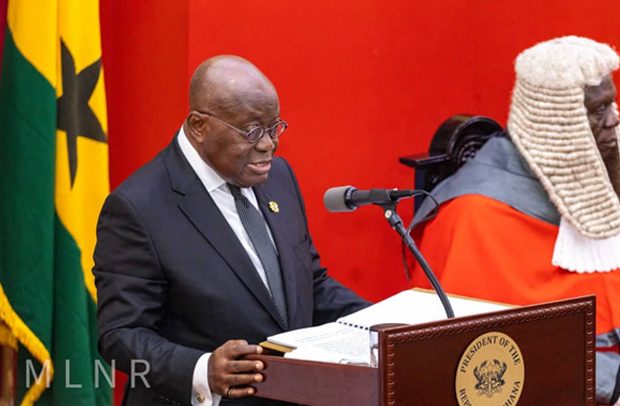
Brong Ahafo Region-based farmer, Philip Kweku Agyeman, has emerged as National Best Farmer for 2017.
Mr Agyeman, whose academic level is basic education, has been farming for the past 28 years and employs over 200 workers.
The 50-year-old farmer took away a cash prize of $100,000 at the event which was on the theme: 'Farming for Food and Jobs'.
This marks a complete change in the Farmer's Day Awards, this being the first time the overall winner has been awarded with such a cash amount. In previous years, the winners were awarded houses at locations of their choice.
Both runner-ups at the event were women? Mabel Akoto Kudjoe from Hohoe in the Volta Region and Rebecca Ann Commey from the Greater Accra Region, first and second runners-up, respectively.
Addressing this year's Farmers' Day Celebration at the Baba Yara Sports Stadium in Kumasi on Friday, President Nana Addo Dankwa Akufo-Addo reassured the nation that Government was determined and committed to developing a sustainable, sound and vibrant agricultural sector that enhanced the performance of all agricultural commodity value chain actors.
To that effect, he said, three hundred and twenty (320) small dams and dugout sites in 64 districts in the northern part of the country had been earmarked for development while 192 will be evaluated in 2018 for development.
In addition, President Akufo-Addo said, a provisional list of 51 dams in the Volta, Greater Accra and Central Regions had been submitted for consideration for rehabilitation.
Subsequently, he said, a water transmission project to distribute water from rivers Oti, the Black and White Volta to communities for productive cultivation, would begin next year, bringing up to 90,000 hectares under irrigation.
The president noted that a thriving agricultural sector engendered prosperity in the society, adding that Ghana's agricultural land did not only have all the ingredients to feed its people, but also the ability to generate jobs and create wealth and prosperity through the modernization of agriculture and a change in attitude towards agriculture.
He deplored the fall of the agricultural sector, as in the last ten years, the contribution of agriculture to GDP had plummeted, recording a low of 18.5% from a high of 42% in 2016, attributing it to post-harvest losses, low productivity, weak link with industry, low application of technology, insufficient agro-financing, land tenure issues and weaknesses along the agriculture value chain.
"We can, and we should overcome these problems, if we keep our focus, ensure efficient and effective implementation of policies and programmes, and rally fully behind Government to give agriculture the decisive impulse it needs, to take its pride of place once again," the President said.
President Akufo-Addo said tackling the problems of the agricultural sector would involve the operationalization of a comprehensive plan that would enhance food security, improve farm productivity, strengthen linkages with industry and, invariably, create jobs and improve rural livelihoods and wealth for all Ghanaians.
He said the thrust of the key policies in pursuance of the objectives was to promote agribusiness by placing emphasis on agricultural value chain development in partnership with the private sector.
He disclosed that the crops sub-sector? the key driver of growth for the agricultural sector? had, this year, benefited from various interventions through the programme for Planting for Food and Jobs.
President Akufo-Addo mentioned the interventions as including the distribution of improved seeds, improved extension services and the acquisition of agricultural machinery and equipment from Brazil under the "More Food International Programme," adding that equipment were being used in diverse ways along the agricultural value chains, which included land preparation, seeding, crop protection, harvesting and primary processing," he added.
He disclosed that in line with government's target of promoting all-year-round cropping, preparatory activities were ongoing to implement the "One Village One Dam" agriculture development agenda.
Implementation of an agricultural programme with the help of multilateral partners, he explained, would also potentially bring about 1,732 hectares of land under irrigation through solar pumping from rivers, sinking of bore holes, rehabilitation of existing irrigation schemes and the construction of new ones.
Touching on agricultural finance, the President said this area had been identified by the private sector as one of the most limiting factors to investment in agriculture.
He said the Ghana Incentive-Based Risk Sharing Agricultural Lending Scheme (GIRSAL), initiated with the assistance of AGRA, was expected to improve and provide incentives for commercial lending to agribusinesses in Ghana.
The President mentioned road infrastructure as another area of critical importance for private sector investment in agriculture.
Consequently, he said, government was intensifying efforts to develop the road network through the Ghana Infrastructure Investment Fund while a good number of strategic roads in the country would be developed with support from multilateral institutions.
President Akufo-Addo gave the assurance that his government would continuously support food production for domestic consumption and the provision of raw materials for industry and exports.
"We aim to increase incomes and enhance livelihoods for farmers and their households," he added, stressing, however, the need for support from all stakeholders, including the nation's gallant farmers, fisher folk, value chain actors, entrepreneurs, financial institutions and friends of Ghana, towards the realisation of Government's agenda of transforming the agricultural sector.
Source: ISD (Rex Mainoo Yeboah)
Read Full Story

























Facebook
Twitter
Pinterest
Instagram
Google+
YouTube
LinkedIn
RSS